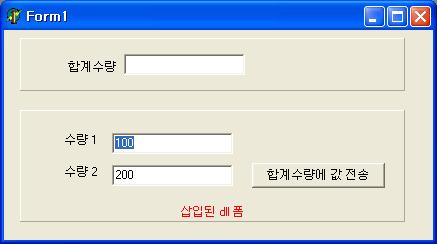Q&A

위 그림처럼 exe 파일에 dll폼 을 패널에 삽입했습니다..
수량1과 수량2의 합계 300 을 합계수량값 전송 버튼을 눌러서 합계수량 에 넣고 싶습니다..
어떻게 해야 하나요 ..?
- 호출된 dll 에서 exe 파일로 값을 전달하려고 하는데 어떻게 해야 하나요?
위 그림처럼 exe 파일에 dll폼 을 패널에 삽입했습니다..
수량1과 수량2의 합계 300 을 합계수량값 전송 버튼을 눌러서 합계수량 에 넣고 싶습니다..
어떻게 해야 하나요 ..?
4
COMMENTS
-

-
 죄송하지만 간단한 예제 하나만 들어 주세요..
죄송하지만 간단한 예제 하나만 들어 주세요..
아무리 봐도 잘 이해가 안 되네욤.. -.- -
 그러면 그냥 USER 메시지를 만드는 방법이 좋겠네요.
그러면 그냥 USER 메시지를 만드는 방법이 좋겠네요.
받는 쪽 즉 Exe 파일 쪽에선 메시지 받아 처리 하고요.
const WM_USERSEND = WM_USER + 10;
procedure WmUserDataSend(var Msg: TMessage); message WM_USERSEND;
procedure TMainForm.WmUserDataSend(var Msg: TMessage);
begin
eb1.Text := IntToStr(Msg.WParam);
end;
보내는 쪽 즉 Dll에선 메시지를 보내면 되겠죠.
const WM_USERSEND = WM_USER + 10;
procedure TForm1.btn1Click(Sender: TObject);
begin
TestValue := StrToInt(lbledt1.Text) + StrToInt(lbledt2.Text);
SendMessage(MyParentForm.Handle,WM_USERSEND,TestValue,0);
end;
-

exe에서 dll을 load하면 같은 메모리 공간에 있게 됩니다.
그러므로 dll에서 얼마든지 메인폼의 객체어 접근도 할수 있고 , 또 얼마든지 메인폼의 public 메소드도 사용할수 있죠
그런데 dll에서 exe의 Form class 를 알수가 없죠
delph에서 컴포넌트를 개발하면 xxx.bpl로 만들어 집니다. *.bpl 파일은 dll의 일종이죠
만약 exe프로그램에서 FormCreate이벤트에 무슨 코드를 넣었다고 합시다.
이 FormCreate 함수는 어디서 호출할까요?
바로 vclxx.bpl 에서 호출합니다. bpl(또는 dll) 에서는 현재 Form의 클래스 구조를 전혀 모르는데...
이것이 가능한 이유는 이벤트 핸들러(함수) 를 걸어 놓았기 때문이죠
다시말해 dll 에 Form을 Show하면서 함수포인터를 하나 넘겨주고 dll에서는 그 함수를 호출하면 된다 뭐 그런것입니다.
이게 코딩하기에 가장 직관적이죠
샘프코드 들어갑니다.
// xxxdll.bpr
function ShowDllForm(App: TApplication;scr:TScreen;parent: TWinControl; func:TCalcEvent): boolean ;
var
frm: TForm2;
begin
Application:=App; // dll을 run-time package를 사용하지 않으면 application객체가 다름
Screen:=scr;
frm:=TForm2.Create(Application);
frm.Parent:=parent; // Form의 Parent 설정
frm.funcRslt:=func; //이벤트 함수 설정
frm.Show;
Result:=true;
end;
exports
ShowDllForm;
//-----------------------------------------------------------
// dll 의 Form2
type
TCalcEvent = procedure(sRslt:String) of object;
TForm2 = class(TForm)
Edit1: TEdit;
Edit2: TEdit;
Button1: TButton;
procedure Button1Click(Sender: TObject);
private
{ Private declarations }
public
{ Public declarations }
funcRslt: TCalcEvent;
end;
var
Form2: TForm2;
implementation
{$R *.dfm}
procedure TForm2.Button1Click(Sender: TObject);
var
sRslt: String;
begin
sRslt:=IntToSTr( StrToIntDef(Edit1.Text,0)+ StrToIntDef(Edit2.Text,0));
if Assigned(funcRslt) then //설정된 함수가 있으면
funcRslt(sRslt); // 호출한다.
end;
이제 exe 코드입니다.
type
TCalcEvent = procedure(sRslt:String) of object; // 메소드 타입선언
function ShowDllForm(app:TApplication;scr:TScreen; parent: TWinControl; func:TCalcEvent): boolean ; external 'myFormDll.dll' name 'ShowDllForm'
//--------------------------------------------
// dll에서 호출할 메소드
procedure TForm1.OnDllClacResult(str:String);
begin
Edit1.Text:=str;
end;
//--------------------------------------------
procedure TForm1.FormCreate(Sender: TObject);
begin
//dll의 Form을 show하도록 dll함수를 호출할때
//Form의 parent와 dll에서 호출할 함수 OnDllClacResult 를 같이 넘긴다.
// application 과 screen을 넘기는 이유는
// dll과 exe가 run-time package를 사용하지 않을경우
// dll에서의 Application객제와 exe에서의 Application객체가 서로 다르기 때문이다.
ShowDllForm(Application,Screen,Panel2,OnDllClacResult);
end;
이상입니다.
(NOTICE) You must be logged in to comment on this post.
-
- 꼬꼬마
- •
- 2008.10.28 23:04
- 2 COMMENTS
- /
- 0 LIKES

-
- 황성일
- •
- 2008.10.28 22:27
- 2 COMMENTS
- /
- 0 LIKES

-
- 이승현
- 2008.10.28 21:45
- 0 COMMENTS
- /
- 0 LIKES

-
- lee, js
- •
- 2008.10.28 21:06
- 1 COMMENTS
- /
- 0 LIKES

-
- 신복현
- •
- 2008.10.28 20:47
- 3 COMMENTS
- /
- 0 LIKES

-
- 이정은
- •
- 2008.10.28 20:38
- 1 COMMENTS
- /
- 0 LIKES

-
- 황성일
- •
- 2008.10.28 03:18
- 2 COMMENTS
- /
- 0 LIKES

-
- 초보임당
- 2008.10.28 01:46
- 0 COMMENTS
- /
- 0 LIKES

-
- 하늘사랑
- •
- 2008.10.28 00:47
- 2 COMMENTS
- /
- 0 LIKES

-
- lee, js
- •
- 2008.10.27 20:53
- 1 COMMENTS
- /
- 0 LIKES

-
- 하늘사랑
- •
- 2008.10.27 20:16
- 6 COMMENTS
- /
- 0 LIKES

-
- 꼬맹이
- 2008.10.27 19:09
- 0 COMMENTS
- /
- 0 LIKES

-
- coderoad
- •
- 2008.10.27 06:52
- 1 COMMENTS
- /
- 0 LIKES

-
- 델파이언
- 2008.10.26 03:31
- 0 COMMENTS
- /
- 0 LIKES

-
- 이은주
- •
- 2008.10.25 18:07
- 4 COMMENTS
- /
- 0 LIKES

-
- 쵸파
- 2008.10.25 09:38
- 0 COMMENTS
- /
- 0 LIKES

-
- 이복만
- •
- 2008.10.25 05:19
- 1 COMMENTS
- /
- 0 LIKES

-
- coderoad
- •
- 2008.10.25 02:41
- 3 COMMENTS
- /
- 0 LIKES

-
- 김상진
- •
- 2008.10.25 00:29
- 4 COMMENTS
- /
- 0 LIKES
위 그림처럼 exe 파일에 dll폼 을 패널에 삽입했습니다.. 수량1과 수량2의 합계 300 을 합계수량값 전송 버튼을 눌러서 합계수량 에 넣고 싶습니다.. 어떻게 해야 하나요 ..?
-
- 사다리
- •
- 2008.10.24 19:54
- 1 COMMENTS
- /
- 0 LIKES



WM_COPYDATA 를 이용하면 됩니다.
아마도 제일 간단한 방법 같습니다. 그리고 사용법 예제는 이미 많이 올라와 있으니 WM_COPYDAT 로 찾아 보세요. ^^